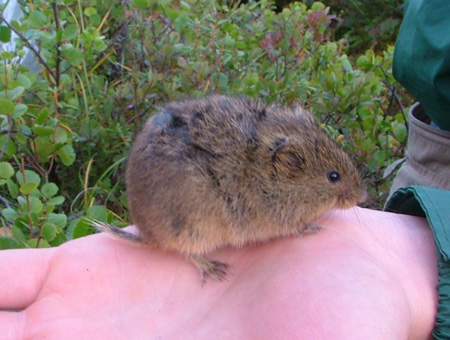|

nps photo
Contact: Brooke Carney, (907) 644-3695 Fairbanks, AK - "Vole wranglers, it's time to head out," announces Melanie Flamme, biologist with the National Park Service. And so begins the annual effort to monitor the small mammal population in Denali National Park. The small mammal monitoring project has been running for almost 20 years, but it's just not the large dataset and informative science that makes this project so interesting. Each year, field work for the project is conducted by high school and college students - the next generation of scientists. Julia Brice, now a sophomore at University of Alaska Fairbanks, started volunteering with the program when she was a freshman in high school. "It was a totally new experience for me. I had never been camping before, and we stayed in a tent for a week during the project. It was really exciting and fun," says Julia. She and the dozen other students who have been involved with the project over the last five years learned about it from an outreach program Melanie and Tracie Pendergrast, a National Park Service Education Specialist, gave to their biology classes at West Valley High School in Fairbanks, Alaska. "Mel did a presentation on her job as a biologist for the National Park Service. It was a really eye-opening and interesting presentation. At the end of it, she told us about an opportunity to volunteer on one of her projects. I'm into biology and animals and thought it would be cool. Mel has been an amazing mentor to me and the other students." Julia has spent the last five summers studying small mammals and became an employed bio-technician this year. A major in wildlife biology, she is currently taking an ecology class. "My teacher uses a lot of case studies, and my experience helps me grasp concepts in class like the idea of a keystone species. The voles are studied [by the National Park Service] because they're a key source of food for so many other animals. There's a reason why they choose specific species to monitor. We can learn a lot about the ecosystem based on what the vole population looks like." The small mammal project is one of several carefully selected monitoring efforts conducted by the Inventory and Monitoring Program of the National Park Service. The species, physical features, and processes monitored are called "vital signs" because they indicate the overall health of natural resources in the national parks over time. One of the lessons Julia and the other students have learned as a result of their involvement in the monitoring program is the amount of careful planning, preparation, and training that goes into conducting field-based studies. "The experience has helped me learn great organizational skills. People need to eat and have a place to sleep, and then there's the science that must get done. It's a balancing act between basic human needs and making the science work. It's empowering to know how to do that," Julia says. For more information on the monitoring efforts conducted in national parks, visit nature.nps.gov or join the conversation on Facebook or Twitter @AlaskaNPS. |
Last updated: April 14, 2015
